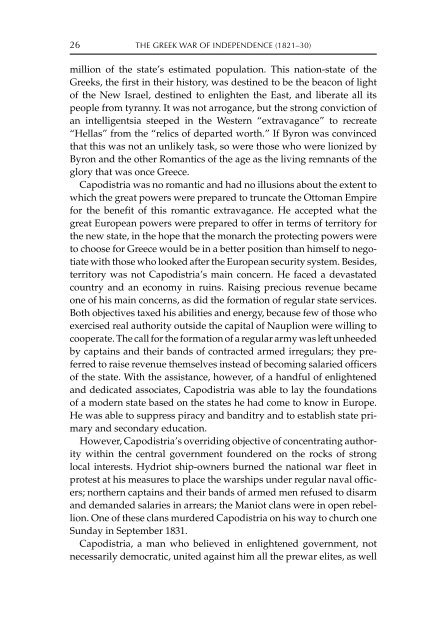MODERN GREECE: A History since 1821 - Amazon Web Services
MODERN GREECE: A History since 1821 - Amazon Web Services
MODERN GREECE: A History since 1821 - Amazon Web Services
You also want an ePaper? Increase the reach of your titles
YUMPU automatically turns print PDFs into web optimized ePapers that Google loves.
26 THE GREEK WAR OF INDEPENDENCE (<strong>1821</strong>–30)<br />
million of the state’s estimated population. This nation-state of the<br />
Greeks, the first in their history, was destined to be the beacon of light<br />
of the New Israel, destined to enlighten the East, and liberate all its<br />
people from tyranny. It was not arrogance, but the strong conviction of<br />
an intelligentsia steeped in the Western “extravagance” to recreate<br />
“Hellas” from the “relics of departed worth.” If Byron was convinced<br />
that this was not an unlikely task, so were those who were lionized by<br />
Byron and the other Romantics of the age as the living remnants of the<br />
glory that was once Greece.<br />
Capodistria was no romantic and had no illusions about the extent to<br />
which the great powers were prepared to truncate the Ottoman Empire<br />
for the benefit of this romantic extravagance. He accepted what the<br />
great European powers were prepared to offer in terms of territory for<br />
the new state, in the hope that the monarch the protecting powers were<br />
to choose for Greece would be in a better position than himself to negotiate<br />
with those who looked after the European security system. Besides,<br />
territory was not Capodistria’s main concern. He faced a devastated<br />
country and an economy in ruins. Raising precious revenue became<br />
one of his main concerns, as did the formation of regular state services.<br />
Both objectives taxed his abilities and energy, because few of those who<br />
exercised real authority outside the capital of Nauplion were willing to<br />
cooperate. The call for the formation of a regular army was left unheeded<br />
by captains and their bands of contracted armed irregulars; they preferred<br />
to raise revenue themselves instead of becoming salaried officers<br />
of the state. With the assistance, however, of a handful of enlightened<br />
and dedicated associates, Capodistria was able to lay the foundations<br />
of a modern state based on the states he had come to know in Europe.<br />
He was able to suppress piracy and banditry and to establish state primary<br />
and secondary education.<br />
However, Capodistria’s overriding objective of concentrating authority<br />
within the central government foundered on the rocks of strong<br />
local interests. Hydriot ship-owners burned the national war fleet in<br />
protest at his measures to place the warships under regular naval officers;<br />
northern captains and their bands of armed men refused to disarm<br />
and demanded salaries in arrears; the Maniot clans were in open rebellion.<br />
One of these clans murdered Capodistria on his way to church one<br />
Sunday in September 1831.<br />
Capodistria, a man who believed in enlightened government, not<br />
necessarily democratic, united against him all the prewar elites, as well


